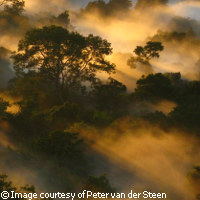Drought threatens Amazon carbon sink
An international team of researchers believes that droughts may have an adverse impact on the Amazon forest's ability to soak up carbon from the atmosphere. Their concerns stem from the fact that a recent drought triggered a slowing in the vast rainforest's growth. The findings of the 30-year study were published in Science. Led by Professor Oliver Phillips from the University of Leeds in the UK, the researchers postulate that climate change may accelerate through carbon losses and changed surface energy balances if the Amazonian forests dry out in this century. 'For years the Amazon forest has been helping to slow down climate change. But relying on this subsidy from nature is extremely dangerous,' explained Professor Phillips, lead author of the study. 'If the earth's carbon sinks slow or go into reverse, as our results show is possible, carbon dioxide levels will rise even faster. Deeper cuts in emissions will be required to stabilise our climate.' The 68-strong team based their study on the Amazon's worst drought in 100 years. According to Professor Phillips, the 2005 drought killed trees and released more greenhouse gases than the annual emissions of Europe and Japan. The data show that around two billion tonnes of carbon dioxide was absorbed by the forest each year in the 1980s, but three billion tonnes were lost in the 2005 drought. 'The total impact was an extra five billion tonnes of carbon dioxide in the atmosphere,' Professor Phillips noted. 'Visually, most of the forest appeared little affected, but our records prove tree death rates accelerated,' the Leeds researcher said. 'Because the region is so vast, even small ecological effects can scale up to a large impact on the planet's carbon cycle.' Contrary to what some people think, the 2005 drought was 'driven by elevated tropical North Atlantic sea surface temperatures, and not El Niño as is often the case for Amazonia', the authors wrote. 'Thus the event of 2005 may provide a proxy for future climate conditions.' Over 50% of the earth's rainforest is represented by the Amazon, which is home to a wide range of species. 'Some species, including some important palm trees, were especially vulnerable,' explained co-author Abel Monteagudo from the Jardín Botánico de Missouri, Oxapampa in Peru. 'Drought threatens biodiversity too.' The researchers from 40 institutions in 13 countries measured changes in carbon storage by evaluating over 100 forest plots across the Amazon's 600 million hectares, as well as identifying and measuring more than 100,000 trees. According to their results, the forests store 120 petagrams of carbon in their biomass; 18 petagrams of carbon is taken up (by photosynthesis) and released into the atmosphere (by respiration) each year. This is more than double the amount generated by fossil fuel emissions caused by man. However, while these forests can influence the concentration of atmospheric carbon dioxide and climate, more data is needed to test this theory, the researchers said. The researchers, who are involved in the Amazon Forest Inventory Network (RAINFOR) that is dedicated to monitoring the Amazonian rainforests, also recorded tree deaths and new trees, and measured and mapped weather patterns. Their findings show that the Amazon forest has acted as a vast carbon sink for a quarter of a century. They said a similar process has also been evident in Africa. 'The Amazon forest spans a large climatic range, from the almost aseasonal high-precipitation northwest to the strongly seasonal southern fringes with frequent prolonged moisture deficits,' the authors wrote. They believe that the distributions of neotropical trees 'reflect their drought sensitivity, and any drought impacts will be experienced by plants as a function of relative departure from their long-term environmental conditions.'

